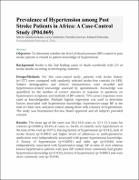| dc.contributor.author | Kaddumukasa, Martin | |
| dc.contributor.author | Goldstein, Larry | |
| dc.contributor.author | Duncan, Pamela | |
| dc.contributor.author | Ddumba, Edward | |
| dc.date.accessioned | 2021-04-30T09:35:59Z | |
| dc.date.available | 2021-04-30T09:35:59Z | |
| dc.date.issued | 2016-02-08 | |
| dc.identifier.citation | Kaddumukasa, M., Goldstein, L., Duncan, P. and Ddumba, E., 2012. Prevalence of Hypertension among Post Stroke Patients in Africa: A Case-Control Study (P04. 069). | en_US |
| dc.identifier.issn | 0028-3878 | |
| dc.identifier.issn | 1526-632X | |
| dc.identifier.uri | http://hdl.handle.net/20.500.12280/2807 | |
| dc.description.abstract | Objective: To determine whether the level of blood pressure (BP) control in post stroke patients is related to patient knowledge of hypertension.
Background Stroke is the 2nd leading cause of death worldwide with 2/3 of stroke deaths occurring in developing countries.
Design/Methods: For this case-control study, patients with stroke history (n=157) were compared with randomly selected stroke-free controls (n=149). Subject demographics and clinical characteristics were recorded and hypertension-related knowledge assessed by questionnaire. Knowledge was quantified by the number of correct answers in response to questions on hypertension symptoms and methods of BP control; 75% correct responses were rated as knowledgeable. Multiple logistic regression was used to determine factors associated with hypertension knowledge, hypertensive-range BP at the time of clinic visit, and poor control among those with a history of hypertension. The study was Institutional Review Board approved and all subjects provided consent.
Results: The mean age of the cases was 58.4 16.0 years vs. 52.1 13.3 years for controls (p=0.0001); 69.4% of cases vs. 54.4% of controls were hypertensive at the time of the visit (p=0.071). Having history of hypertension (p=0.015), lack of stroke history (p=0.0001) and higher levels of adherence to antihypertensive medication were independently associated with greater hypertension knowledge. A history of hypertension (p=0.0001) and older age (p=0.044) were independently associated with hypertensive-range BP at time of visit whereas known hypertensive patients with poor BP control more commonly had greater
hypertension knowledge (p=0.033), history of hypertension (p=0.0001) and were more commonly men (p=0.034).Conclusions: Hypertension is common among Ugandans with and without a history of stroke. Those without prior stroke who had a history of hypertension and were more adherent to control medications were more knowledgeable about their condition although this was not reflected in their BP control. Barriers to effective treatment other than patient knowledge need to be identified. | en_US |
| dc.language.iso | en | en_US |
| dc.publisher | LIPPINCOTT WILLIAMS & WILKINS , TWO COMMERCE SQ, 2001 MARKET ST, PHILADELPHIA, USA, PA, 19103 | en_US |
| dc.relation.ispartofseries | Neurology; | |
| dc.subject | Prevalence | en_US |
| dc.subject | Hypertension | en_US |
| dc.subject | Post-stroke patients | en_US |
| dc.title | Prevalence of Hypertension Among Post Stroke Patients in Africa: A Case-Control Study (P04.069) | en_US |
| dc.type | Article | en_US |


